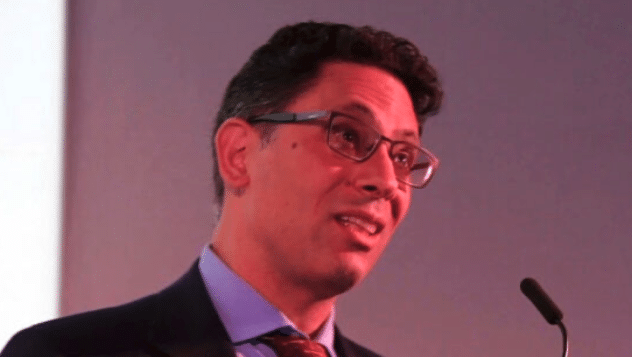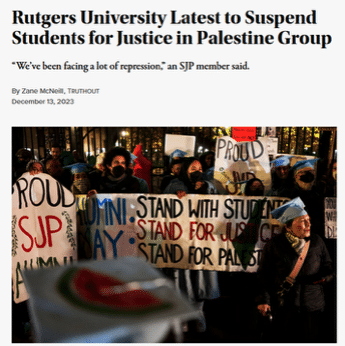
Truthout (12/13/23)
Janine Jackson: Depending on when you hear this, the Rutgers/New Brunswick chapter of Students for Justice in Palestine might be the most recent campus group to be suspended for what administrators called “disruptive and disorderly conduct,” and “failure to comply with university or civil authority.”
SJP is a student-activist network of campus groups in support of Palestinian lives and liberation, and naturally very active now in the midst of Israeli military attacks on Gaza that, as we record, have killed some 20,000 Palestinians minimally, injuring and displacing orders of magnitude more.
Calls for a ceasefire, at least, are growing in this country and around the world, but that’s in the face of ever-more aggressive, top-down efforts to shut those calls, and the people making them, down. If we are to resist what many are calling a new McCarthyism, we need to inform ourselves of what and where the concerns are, and to stay in conversation with one another.
Here to help us with both of those is Wadie Said, professor of law and dean’s faculty fellow at the University of Colorado Law School, and author of the book Crimes of Terror, out from Oxford University Press. He joins us now by phone. Welcome to CounterSpin, Wadie Said.
Wadie Said: Thank you for having me.
JJ: Listeners will have heard the unsettling reports—more, it seems, each day—of not only student groups being shut down on campus, but powerful people calling for publishing lists of the names of any students who even sign a petition, so that they can be denied future jobs.
We’ve seen editors and journalists and other workers fired, forced out or reprimanded for indicating in any way that they oppose, not even the state of Israel, but the killing and harming and displacing of thousands and thousands of people. Poetry and art events canceled, just for suggesting support for Palestinians, and many of it coming with this kind of fig leaf of: This targeting—which to be clear, we do hope ruins your life—it isn’t just because you don’t support Israel in all of its actions, but because, by our reckoning, you insufficiently oppose Hamas and what it does.
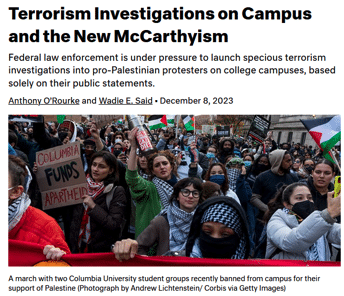
Dissent (12/8/23)
It is lost on few people who are paying attention that we are living in a very disturbing moment for an aspiring democracy, and it’s within this context that we see the piece that you recently co-authored with Anthony O’Rourke for Dissent, in which you warn that this is potentially moving beyond private institutions like universities or Wall Street companies using their power to sanction or to intimidate—not that that doesn’t mean real, material harm—but moving to federal law enforcement facing pressure to employ a particular federal statute that kicks a number of other things into play.
And you note that this tool wasn’t even at the hands of the FBI during the COINTEL Program, which some of us will remember from the 1960s. So there are levels of troubling things happening here, but let’s get started with: What is the statute that you’re talking about, and why are you concerned that it could come into play right now?
WS: The ban on providing material support to designated foreign terrorist organizations, with the law that was passed by Congress as part of a larger omnibus bill that purported to reform both—and, I use “reform” in the most euphemistic sense of the word, it was actually a kind of crackdown on immigration to this country, and also on habeas corpus rights for federal and state prisoners, where the avenues for relief were significantly narrowed.
And within the confines of this larger bill, there was an element that purported to take on the problem of terrorism. And this was in 1996 that the law was actually passed. So it predates the September 11 attacks by over five years. And the way the law works, is it gives the secretary of state the authority to designate organizations, provided that they’re one, foreign; two, engage in terrorist activity; and three, that terrorist activity hurts American national security, or other foreign interests or economic interests of the United States.
And this is a finding that’s completely within the province of the secretary of state. So this isn’t something that you or I or anyone else can challenge in a court. In fact, the only way to challenge a group being designated as a foreign terrorist organization is if someone were to argue, well, you got the wrong group, or you got the name wrong, or something like that. Just on purely administrative basis. There’s no substantive basis to challenge this.
And once the group is designated as an FTO, or foreign terrorist organization, individuals, wherever they are, are prohibited from providing what is called material support. And when the law was passed in 1996, the idea was that there was a problem in the United States that Congress was cracking down on, terrorist organizations raising money via humanitarian or charitable activity.
And the idea was that Congress made a finding in passing this law that money is fungible, and so money for legitimate charitable activity—the government never challenged that the activity in question was charitable activity. They just said that if a terrorist group is raising money for charity, that frees up money for buying weapons and conducting violent activity. And it can be banned as such. It can be criminalized as such.
The interesting thing here of—well, there are many interesting things, but some of the interesting things here are, for example, one, this bill created a list of foreign terrorist organizations, but it was passed in the wake of the Oklahoma City bombing, which was a decidedly domestic act. And there’s no corresponding list of domestic terrorist organizations.
Two, this purported problem of terrorist organizations raising money in the United States under the cover of humanitarian activity, I personally have never seen, and I’ve been following this law since it was passed, and litigating it and studying it for over 20 years. And I do have to say I have never seen evidence that this was a really pressing problem, that the United States was somehow a way station for terrorist organizations to raise money under cover of charitable activity. So there’s that issue as well.
And then, the final issue is that the concept of material support, money and weapons and things like this, tangible items that contribute to an organization’s illegal ends or illegal goal, that has expanded to include things like free speech. So in 2010, the Supreme Court, in a case called Holder v. Humanitarian Law Project, decided that “material support” in the form of speech could be criminalized.
So the group of the day is Hamas, the Islamic resistance movement; if I wanted to say, “Hey, you need to work according to international law and be less violent and use peaceful means to pursue your goals and get away from violence,” I could be prosecuted for providing material support to a foreign terrorist organization, provided that that support is done in coordination with, or under the direction of, the foreign terrorist organization.
The key stop that the Supreme Court put in place, because they realized that this was going after what was otherwise protected free speech, the key stop or safety valve provision that they put in, well, they said, provided the speech that is being criminalized with material support has to be “in conjunction with,” or “at the behest of,” a terrorist organization. Independent advocacy is not covered.
So that’s why when we see, for example, the Brandeis Center (which is not affiliated with Brandeis University, as my co-author Tony O’Rourke has pointed out several times), and the ADL, when they make the call for students, pro-Palestinian activist students, to be investigated under this law, it’s disingenuous for numerous reasons, but primarily because there is no evidence, as far as I know of, that these students are acting in coordination with or at the behest of Hamas, for example.
So this is a kind of an interesting gray area, where the call to investigate and the concept of material support, it’s broad enough that perhaps the FBI or other federal agencies could investigate. It may not lead to criminal charges, but the fact of an investigation is enough of an impediment and enough of a chill to be alarming to those of us who believe that free speech rights should be much better protected.
JJ: Absolutely. And I think the word “chill” is of course important here. There was, listeners may know, a Senate resolution that condemned anti-Israel, pro-Hamas student groups. And that language—you don’t have to be a historian or a regional expert to understand that “anti-Israel,” “pro-Hamas,” is very inexact language, and intentionally broad and leading. And you can hear the echoes of it. If you were someone who condemned the U.S. invasions of Afghanistan and Iraq, there were people online who called you pro—Al Qaeda or whatever, but it didn’t necessarily, although it did in some cases, come with this law enforcement, federal definition that that speech was in fact in support of a foreign terrorist operation.
So I think what we’re trying to say, or what I’m trying to say, is there’s a whole lot of discretion involved here by federal law enforcement: who they choose to identify as a threat, what they call material support, who they use it against, who gets to bring the cases. These are kind of the questions that you’re bringing up in that piece, that it’s not like, this is a law and it’s just being applied. This is a law with a whole lot of discretion being very particularly or potentially particularly applied.
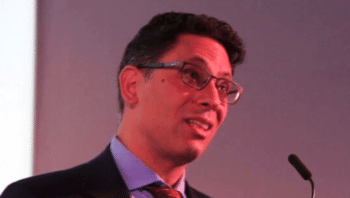
Wadie Said: “There’s a question of who gets on the list…. It’s not something that you or I can say anything about or influence.” (image: The Mosaic Rooms)
WS: Of course. And I think one of the things that I identified, again, many years ago, when I was a federal public defender and working on a case involving material support charges, and I’ve talked about this quite a bit in terms of my writing, but I initially saw it in the context of a terrorism prosecution, where you see how the material support law has what I call a double selectivity problem.
The first is, “Who gets on the list?” So it’s not every group that engages in—not every non-state group, it has to be said; these are all non-state actors, with the one exception of the Iranian, it’s kind of confusing, the Iranian Republican Guard, but they call themselves the Islamic Republican Guard, that’s part of the Iranian government. So that’s the one exception to the whole apparatus that targets non-state groups, with the one exception of this Iranian group, but basically targets these non-state groups.
So there’s a question of who gets on the list, OK, which is 100% within the discretion of the secretary of state. It’s not something that you or I can say anything about or influence.
And then there’s a question of, even if a group gets on the list, it doesn’t necessarily mean that anyone’s going to be prosecuted for providing material support to any particular FTO, because, like you mentioned, this is all discretionary. Prosecutors have basically unreviewable discretion to bring these type of cases, provided they’re free of overt bias, which is almost impossible to prove.
But, for example, I tried to make the argument that my client and his co-defendants were being singled out and prosecuted for providing material support, or conspiring to provide material support, to the Islamic Jihad Movement for Palestine, or the Palestinian Islamic Jihad, which is also a designated foreign terrorist organization, because the government didn’t like their politics, and was singling them out.
Whereas there were individuals in this country who the FBI had investigated who were active on behalf of an Israeli foreign terrorist organization, called Kach or Kahane Chai, and the FBI investigated the Kahane movement in the United States, and it raided their offices and seized all sorts of equipment and computers and documents, etc. And it knew exactly who these people were. And it looked from media reports that they were actively raising money in the United States, but nobody, to my knowledge, from the Kahane movement in the United States or outside was ever prosecuted.
And now, interestingly, in 2022, the Biden administration, actually Secretary of State Blinken, actually removed the Kahane organization Kach from the list of foreign terrorist organizations. I could say a lot more about that, given that some of their main leaders are now actually high-ranking ministers in the Israeli government.
This is all a way of saying that this statute is rife for eye-of-the-beholder kind of discretionary, I would argue unfair, or selectively prosecuted, types of cases.
JJ: Well, and just adding to that, and I definitely want to indicate for folks that DissentMagazine.org is where this piece by Wadie Said and Anthony O’Rourke appears that we’re talking about. But the FBI, as you also point out, they’re trying to enlist campus law enforcement on these crackdowns and on these sort of lists. And, again, it’s a kind of authority versus authority. And we’ve seen campus law enforcement resist those efforts when it comes to immigration, for example. So in other words, these tools that are being used to get onto campus and name people who we’re going to call violators of law, campus authorities have had an opportunity to say the degree to which they’re going to get federal law enforcement involved in what they’re doing, and they’ve chosen against it other times. So there are tools they have to use if they want to resist this kind of encroachment.
WS: That’s a really interesting point, because I think in the context of immigration, there’s an understanding on behalf of university leadership around the country, private and public universities, that immigration and foreign students, and being attractive as a place for where foreigners would want to come and study, is a critical interest of the American university system, and how it operates and generates—I hate to use this horrible phrase—but generates revenue. And it basically is a kind of critical component in the way the American university markets itself.
So like you said, universities, when faced with draconian immigration laws and calls for crackdowns on immigrants, the universities resist, and university administrations resist. What we saw, I think it was two weeks ago, with the university presidents of Harvard, MIT and Penn being called before a committee in the House to testify about on-campus tumult and the issue of antisemitism, and they were faced with Representative Stefanik saying that “intifada” is a call for genocide of Jews, and “from the river to the sea” is a call for the genocide of Jews, which to me is an afactual assertion at best, and a malicious falsehood at worst. And when that occurred, none of the university presidents challenged her on the facts and said, “This is an outrageous assertion that you’re making.”
So in the Palestinian context, the first Intifada, from 1987 to 1993, was a largely peaceful uprising against what was then, and still now, the longest military occupation of modern time. So it’s a moment of great pride in the Palestinian consciousness, and she was basically equating it to a call for genocide of Jews.
And the phrase “from the river to the sea” is also intentionally misunderstood and misused for purposes that don’t reflect the facts of what it stands for. And none of the university presidents said anything about that. They didn’t say, “Well, actually your assertion is wrong.” They just kind of dithered and kind of wound themselves up, which provided fodder to people like Representative Stefanik and those who share her position, that this was somehow denying or endorsing calls for genocide, which is of course the monstrous twisting of the fact.
And it’s on that note that I think university administrations don’t fully grasp, or are scared to grasp—and I can’t figure out which it is. In my mind, for example, my question was, do these university presidents really not know what the term “intifada” means? It means “shaking off” in Arabic, or loosely translated as “uprising.” Do they really not know that, or do they know and are they scared to engage? Either way, it’s alarming.
So I think that in that context, there’s a real deep fear that university administrators must have in grappling with these issues that they don’t, for example, in the context of say, immigration.
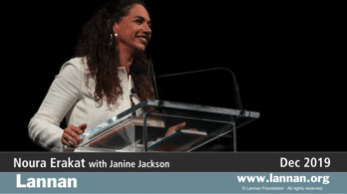
Lannan Foundation (12/4/19)
JJ: Just to sort of pivot from that, I feel a certain sense of desperation in terms of: Anybody asking questions is supposed to shut up. And then you go on TikTok or any other social media, and you see all kinds of people, not only young people, saying, “I just don’t believe what the media’s telling me. I see the message they’re trying to give me, but I’m just not buying it.” And the idea that questioning and dissenting should mean that you should go away doesn’t read to people. It doesn’t land in the same way as maybe some folks will think that it is.
But I do think that it has to do with some people’s understanding, including my own, of law. You think that there’s a law, surely this is against the law, and if we just apply the law, and I remember this from a conversation I had with Noura Erakat a couple of years ago, the importance of not equating law with justice, and of helping the public conversation understand that law and justice are not the same thing. But it’s a difficult thing to interpret and understand.
WS: Yes, for sure. So one thing I think that you mentioned, that was exceedingly important to my view, is that you’re seeing these calls for a crackdown. You’re seeing attempts at what has been deemed McCarthyite or a new type of McCarthyism, and you’re seeing young people just not letting it deter them. They’re not being deterred, which is, I think, a real point of hope, a point of departure from the past, from the McCarthy era itself.
And I think that when you have, for example, wealthy billionaires, hedge fund managers, saying they want to know what students are saying so that they don’t hire them, I think you’re hearing the message from students that also they don’t really care to work for people like that. So they’re going to continue to advocate for the principles that matter to them, as opposed to kowtowing to people they think are not worthy of their time or energy anyway to begin with. There’s no meeting of the minds there.
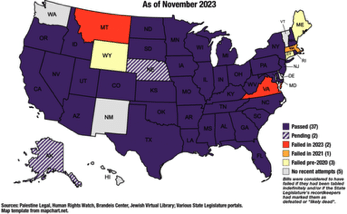
Source: Wikipedia/Mapchart
And to feed it into the last point, and what you were talking about with Noura, the law itself is clearly, in this context, the material support law, but other laws that target Palestinians and pro-Palestinian advocacy, like we’ve seen over 30 states with anti-BDS laws, etc.—there’s a reckoning that’s taking place between what people in this country believe about what they think their freedom should be, what they think their rights should be, with the First Amendment at the heart of it, and the laws that the government has passed.
It was really interesting to me that, very early on in this current Israeli assault on Gaza, when the calls for the first poll came out, it was in a couple of weeks, then the first poll came out that said the majority of Americans support a ceasefire. And almost no one in Congress had called for that at this point.
And Pramila Jayapal, the leader of the Progressive Caucus in Congress, mentioned something, she said the American people are not where Congress is on this issue. Or she maybe said it the other way around, that Congress is not where the American people are. It’s very interesting, because you see popular support for a ceasefire continues to grow. The latest polls were, for example, that the handling of this current war, assault on Gaza— the fifth major one in the last 15 years, by the way—people are overwhelmingly unhappy with the Biden administration’s response, and the Biden administration doesn’t seem to understand why.
So this issue of justice and what is right and what as a country we should be standing for is still incredibly contested, despite government and certain political leaders and certain business leaders taking the opposite stand, and people are standing up to them, which is I think giving those of us who are deeply concerned and highly alarmed at what’s going on in Gaza, and the Middle East more generally, as a source of hope.
JJ: Well, and we’ll be continuing this conversation, I’m quite sure, going forward.
We’ve been speaking with Wadie Said, professor of law and Dean’s Faculty Fellow at the University of Colorado Law School, and author of the book Crimes of Terror, which is out from Oxford University Press. You can find his article, “Terrorism Investigations on Campus and the New McCarthyism,” co-authored with Anthony O’Rourke, online at DissentMagazine.org.
Wadie Said, thank you so much for joining us this week on CounterSpin.
WS: Thank you very much. I really enjoyed it.

